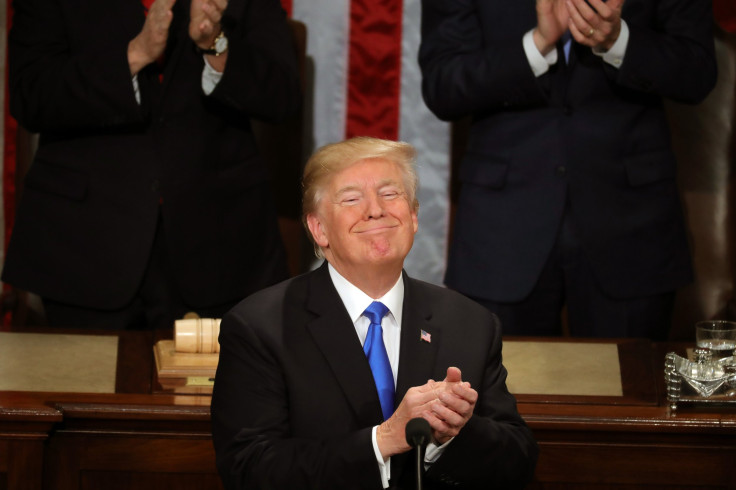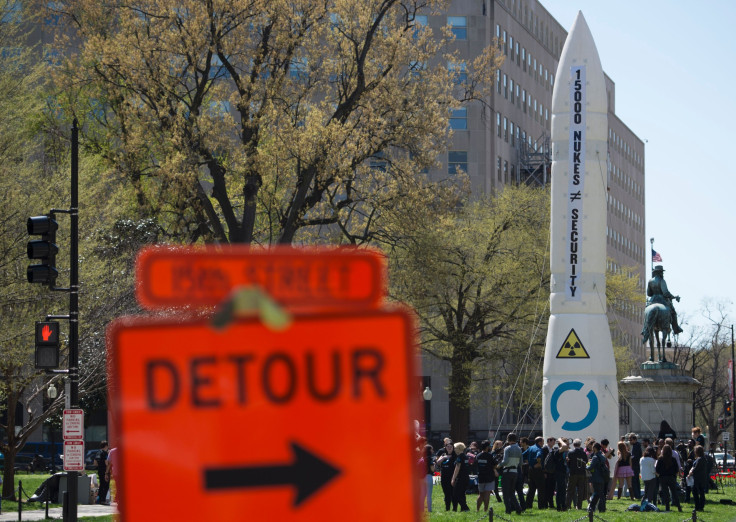Trump’s Power To Launch Nuclear Weapons Could Be Restricted By New Bill

In his state of the union address this week, President Donald Trump promised to modernize the United States’ nuclear arsenal, “making it so strong and powerful that it will deter any acts of aggression.” The promise came only a few weeks after Trump taunted North Korea with boasts about the United States' nuclear arsenal. All of the nuclear-themed declarations have prompted fears that the first-term president could launch nuclear weapons at any moment — and they have also prompted new legislation to limit Trump’s power to issue such a launch order.
In a new podcast interview, the bill’s sponsor, Democratic U.S. Rep. Ted Lieu, told International Business Times that the situation spotlights what he says is a problematic lack of checks and balances. Lieu argued that his legislation would address that problem by requiring congressional authorization for any president to launch nuclear weapons in a first-strike situation.
Subscribers can click here to listen to the entire podcast. What follows is a lightly edited excerpted of the conversation.
Do you agree with those who argue that President Trump’s nuclear rhetoric and his sometimes erratic behavior shows that he is mentally unstable?
I'm not a mental health professional so I can't comment whether there is a mental health issue or not with our president, but I am seeing what everybody else is seeing, which is a president that has written some highly disturbing tweets. A president that has threatened nuclear war with North Korea, and a president that has acted erratically. We should be concerned that he now has the ability to launch nuclear weapons with literally no checks and balances. If you look at our nuclear launch approval process, it requires the approval of the National Command Authority, which seems really impressive till you read it. It is just two people. It's the president and his Secretary of Defense.
Do you believe it was wrong for the United States to set up its nuclear weapons system up in a way that lets a president instantly launch an attack?
The bill that Senator Ed Markey and I introduced applies to a premeditated nuclear first strike. It wouldn't apply to the United States right to self defense. If the president saw Russia or China launching nuclear missiles at us, he could go through the normal launch approval process and respond within minutes. But I think there is a problem where you allow the president to launch a nuclear first strike without any congressional authorization. That's what we're trying to restrict.

The president has been criticized for his belligerent tweets and provocative nuclear rhetoric. Is it possible that his declarations are not true threats of a nuclear war, but are instead designed to scare the United States’ enemies, and deter them?
I don't think that that's what the president actually is doing. I think if you were to read the book Fire and Fury, if you were to read other articles, what you see is just a lot of chaos in the White House. I don't think there is some sort of grand strategy, but even if there was, I just disagree with it.
I sit on the House Foreign Affairs Committee. One of the things you want to avoid is a fatal miscalculation. The president has said on more than one occasion he wants to be unpredictable. I think in domestic politics that is fine, but in foreign affairs, that's just stupid.
Here is just a simple thought experiment. Would any of us have wanted President Kennedy to be unpredictable during a Cuban missile crisis? The answer is no. You want a president that's calm and rational, and you want our allies and enemies to understand what America's foreign policy objectives are, and not to have contradictory statements come out from the administration nearly on a weekly basis.
How has the president’s nuclear rhetoric shaped the United States’ relationship with other countries?
Donald Trump's behavior is pushing our allies away from the United States. I think you see that in South Korea, you're going to see I believe the South Koreans try to engage the North Koreans much more. They can't but help come to the view that Donald Trump is more than willing to sacrifice millions of South Korean lives at a moments notice. You're going to see, I think, our allies no longer rely on the U.S., and view us as an unreliable partner and that's unfortunate.
The U.S. military’s top nuclear commander recently said that he would refuse to follow an illegal order. What do you think he meant by that?
I think that the general said the right thing, which is you don't follow an illegal order. Military members are trained not to follow illegal orders, but think how extraordinary it is that an Air Force General even had to make that kind of statement. I think it goes back to the erratic behavior of our current president. But you don't want to sort of have our national security, and the security of the world, rely on military members who disobey the president. That can't be the check and balance. The check and balance has to have I think much more robust ways of trying to stop what would be an illegal launch of nuclear weapons.
When you talk to Republicans on Capitol Hill, what have you heard them say about your bill to required congressional authorization for a nuclear first strike?
We deal with a thousand issues here in Congress, so most people are not still walking around thinking about the nuclear launch approval process. When they first hear about it, they have a similar reaction of what many people have, which is we need to you know, give the president the ability to launch nuclear weapons at a moments notice, to deter our adversaries, which I generally agree with, but again what we're talking about is a premeditated nuclear first strike. That's a very different situation.
Once you walk people through that, then many of them start coming on board. Now we have 76 co-authors of the bill, I'm very pleased. It is also now bipartisan as well. What we're trying to prevent is the president basically waking up one morning and deciding that you know, he's had enough with North Korea, and he just wants to nuke them. That's the situation we're trying to prevent from happening.
Recent reports have indicated that the Trump administration is considering a so-called “blood nose” attack on North Korea, that would avoid using nuclear weapons. Do you think that a good idea? And do you think that would escalate into a nuclear war?
I served an active duty in Guam, and we would always use different military exercises, much of it was directed against North Korea, and I know that there are exactly zero good military options against North Korea. One of the reasons is, we don't know how to contain escalation. We have very little intelligence on this regime. Our Intelligence Committee assesses the regime to be paranoid, and they think the U.S. is going to attack them.
As a result, if we were to let's say do this quote on quote bloody nose strategy and launch some missiles at North Korea, who knows what they're going to do. At that point we're counting on a paranoid regime with a paranoid leader, trying to act rationally.
Maybe they act rationally and respond with just a few artillery shells of their own, or maybe they go crazy and just launch everything in which case a lot of people are going to die. We have no idea what's going to happen, that is the problem. We don't know how to contain escalation, especially with a regime that we have so very low intelligence on.
© Copyright IBTimes 2024. All rights reserved.












